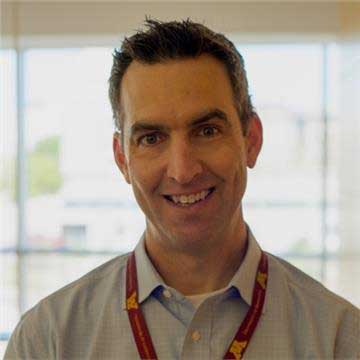Working as a direct support professional can teach you many effective communication skills, such as positive social strategies, interpersonal communication and plain language. The ability to use plain language is not only a helpful skill for many jobs, but it is now a requirement of many employers. Some direct support professionals also learn specialized communication skills for supporting people who are visually impaired, deaf or hard of hearing or who use alternative forms of communication (such as electronic devices or picture boards). Developing professional and specialized communication skills early in your career can be a valuable asset when searching for future employment.
 Taylor provided direct care to people with disabilities before coming to DHS where he supervises one of the communications teams. Here is his story:
Taylor provided direct care to people with disabilities before coming to DHS where he supervises one of the communications teams. Here is his story:
What experience did you have in providing direct care?
I started out as a job coach working for the Transition PLUS program in the St. Paul School District. In addition to job coaching, I was involved in supporting youth with disabilities in developing independent living skills, transportation, social skills development and accessing community services. I worked in transition for many years with PACER Center, the Institute on Community Integration, Minnesota Life College, Centers for Independent Living and for a waivered service provider, Interdependence Inc., where I supported adults in the community and coaching adaptive recreation sports. These experiences allowed me to see the impact of our social service system on both youth and adults with disabilities. These experiences were critical in not only my professional career, but also from a personal perspective. I saw firsthand how these services supported the idea of a self-directed life and how policies, services and advocacy were critical in building communities that were inclusive to all our citizens.
What career do you have now?
I currently work as the supervisor of the Training, Technical Support and Communications team within the Disability Services Division at the Department of Human Services. This team is critical in supporting the operationalization of our state and federal policies so that people are able to receive the highest quality services, as well as supporting our lead agencies and service providers in administering and delivering these services.
How does your early experience doing direct care help you to be effective in your current job?
I understand how the work we do at DHS impacts our social service system directly. My experience in schools, research institutions, non-profits and with service providers has given me a comprehensive view of how all these things work together. It has also allowed me to develop a broad network of colleagues that I use to this day.
As someone who has worked directly with youth and adults with disabilities, their families and the professionals that support them, I can transfer my experience and knowledge into the work I do. Most importantly, I feel that it is a privilege to be involved in this work as I feel strongly that people deserve the opportunity to work, live, learn and have fun in the communities of their choice in a manner that best suits their interests and needs. I am proud of the work we do here at DHS and without my previous experience, I don’t think I would be as effective in my current position. My message to others looking to work as a direct support professional: This work can undoubtedly lead to greater opportunities in your own professional journey so I encourage anyone to see this work as a first step in creating a fulfilling career.